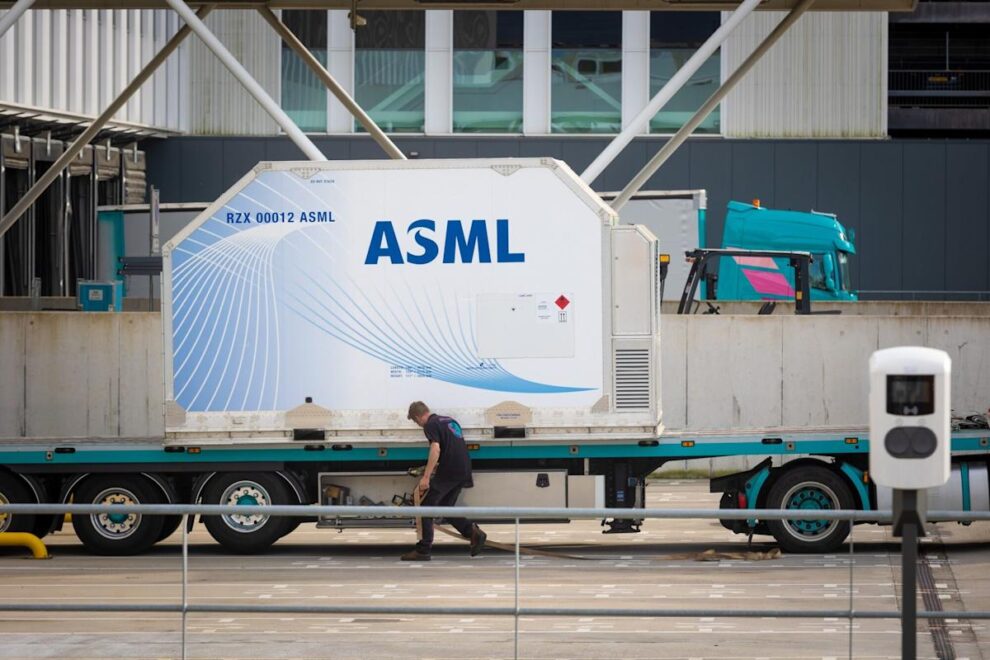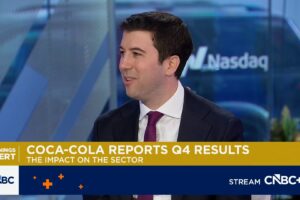
(Bloomberg) — ASML Holding NV Chief Executive Officer Christophe Fouquet walked back the company’s growth forecast for next year due to trade disputes, even though second-quarter orders beat estimates.
Most Read from Bloomberg
“Looking at 2026, we see that our AI customers’ fundamentals remain strong,” Fouquet said in a statement on ASML’s quarterly results Wednesday. “At the same time, we continue to see increasing uncertainty driven by macro-economic and geopolitical developments. Therefore, while we still prepare for growth in 2026, we cannot confirm it at this stage.”
The Dutch company reported bookings of €5.5 billion ($6.4 billion) in the second quarter, it said in the statement. That compares with an average estimate of €4.8 billion by analysts in data compiled by Bloomberg.
Fouquet highlighted the threat of tariffs for new systems and parts sent to the US, as well the threat of other countries reacting with reciprocal measures. Tariffs could also negatively hit ASML’s gross margin, he said.
Semiconductors are currently exempt from US tariffs but there’s uncertainty over how chip-making equipment will be affected. The Trump administration’s chaotic rollout has roiled markets and made planning major spending difficult.
ASML forecast third-quarter net sales between €7.4 billion and €7.9 billion, missing estimates. It expects 15% revenue growth for the year.
ASML, which counts Taiwan Semiconductor Manufacturing Co. and Intel Corp. among its customers, is poised to benefit from hundreds of billions of dollars of investment pouring into AI data centers because it is the only company that makes extreme ultraviolet lithography machines. That technology is needed to produce Nvidia Corp.’s most cutting-edge chips, which are the backbone of much of the planned AI infrastructure.
Signs of a thaw between the Trump administration and Beijing could bode well for ASML. On Tuesday, Nvidia and Advanced Micro Devices Inc. said they would restart sales of some chips to China that had previously been blocked, after gaining assurances from Washington that the shipments would be approved.
ASML faces a number of limits on its sales to China, which was the company’s second-biggest market in the first quarter. It has never been able to sell its most-advanced EUV machines to China because of US-led restrictions. Last year, the Dutch government also blocked immersion deep ultraviolet lithography systems to the country after pressure from the US.
There’s no suggestion so far that ASML machines would see a relaxation of the rules, but it would benefit from higher demand from its customers selling more to China.
Belt tightening further along the supply chain has hit ASML, too. Intel is slashing expenses in a restructuring that includes delays to planned factories in Germany and Poland.
What Bloomberg Intelligence Says
ASML’s 2Q results and 3Q outlook, released July 16, imply its business environment hasn’t materially changed despite US tariffs on imports of chip-making tools and limits on sales to China. Its 2Q order bookings of €5.5 billion suggest the company could sustain strong system sales in 3Q and 4Q. As ASML has maintained guidance of 15% sales growth for 2025, it could report strong sequential growth in 4Q sales. — BI analysts Masahiro Wakasugi and Takumi Okano
Samsung Electronics Co. reported its first fall in profit since 2023 last week as it lost market share in the AI market, although some analysts expect the company to hit bottom this summer.
ASML’s shares rose 2.7% to €706.10 in Amsterdam on Tuesday. They have fallen 28% in the last year.
Most Read from Bloomberg Businessweek
©2025 Bloomberg L.P.











